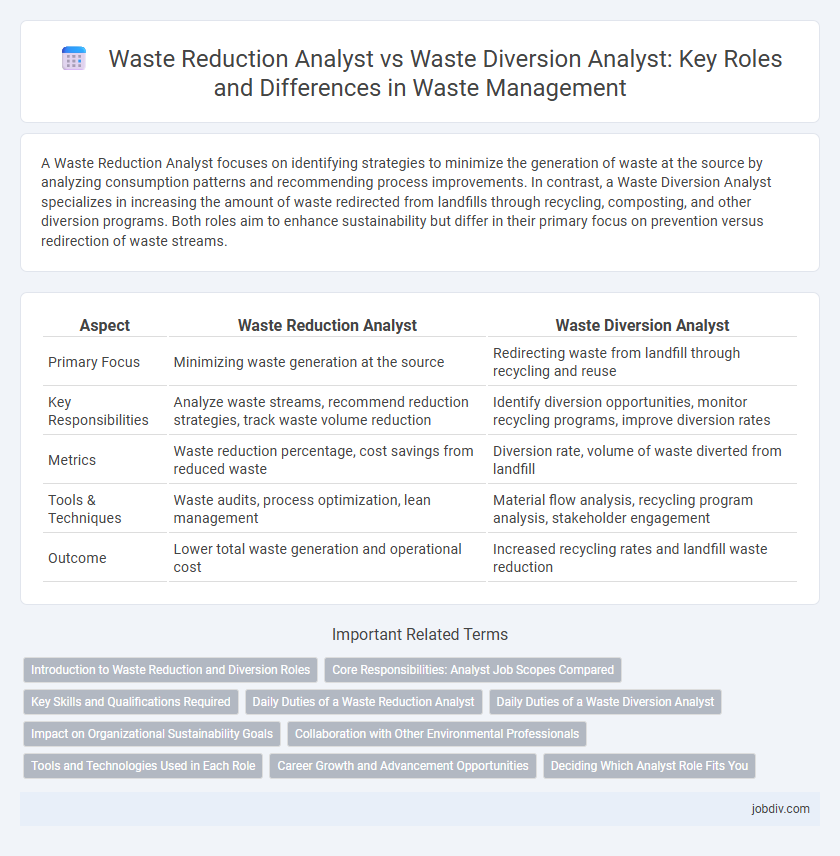A Waste Reduction Analyst focuses on identifying strategies to minimize the generation of waste at the source by analyzing consumption patterns and recommending process improvements. In contrast, a Waste Diversion Analyst specializes in increasing the amount of waste redirected from landfills through recycling, composting, and other diversion programs. Both roles aim to enhance sustainability but differ in their primary focus on prevention versus redirection of waste streams.
Table of Comparison
| Aspect | Waste Reduction Analyst | Waste Diversion Analyst |
|---|---|---|
| Primary Focus | Minimizing waste generation at the source | Redirecting waste from landfill through recycling and reuse |
| Key Responsibilities | Analyze waste streams, recommend reduction strategies, track waste volume reduction | Identify diversion opportunities, monitor recycling programs, improve diversion rates |
| Metrics | Waste reduction percentage, cost savings from reduced waste | Diversion rate, volume of waste diverted from landfill |
| Tools & Techniques | Waste audits, process optimization, lean management | Material flow analysis, recycling program analysis, stakeholder engagement |
| Outcome | Lower total waste generation and operational cost | Increased recycling rates and landfill waste reduction |
Introduction to Waste Reduction and Diversion Roles
Waste Reduction Analysts specialize in identifying strategies to minimize waste generation through practices like process optimization, material substitution, and behavioral changes. Waste Diversion Analysts focus on increasing the redirection of waste from landfills by enhancing recycling, composting, and reuse programs. Both roles are critical in achieving sustainable waste management goals and improving environmental compliance for organizations.
Core Responsibilities: Analyst Job Scopes Compared
A Waste Reduction Analyst primarily focuses on identifying strategies to minimize waste generation through process improvements and behavioral changes, analyzing data to optimize resource use and reduce environmental impact. In contrast, a Waste Diversion Analyst concentrates on increasing the amount of waste diverted from landfills by enhancing recycling and composting programs, assessing diversion rates, and developing initiatives to maximize material recovery. Both roles require strong analytical skills but differ in scope; waste reduction emphasizes prevention at the source, while diversion targets managing waste post-generation to improve sustainability metrics.
Key Skills and Qualifications Required
A Waste Reduction Analyst requires expertise in data analysis, environmental regulations, and project management to identify strategies for minimizing waste generation and improving process efficiency. In contrast, a Waste Diversion Analyst focuses on skilled knowledge of recycling systems, material recovery technologies, and stakeholder engagement to maximize waste diversion rates from landfills. Both roles demand strong analytical abilities and proficiency in sustainability metrics, but the Waste Reduction Analyst emphasizes waste prevention, while the Waste Diversion Analyst centers on redirecting waste streams.
Daily Duties of a Waste Reduction Analyst
A Waste Reduction Analyst evaluates waste generation data to develop strategies that minimize overall waste production and improve operational efficiency. They conduct audits, analyze materials flow, and recommend process improvements to reduce resource consumption and waste creation at the source. Their daily duties include collaborating with departments to implement sustainability initiatives and tracking waste reduction metrics to measure the impact of their efforts.
Daily Duties of a Waste Diversion Analyst
A Waste Diversion Analyst focuses on tracking and analyzing waste streams to maximize recycling and composting efforts, ensuring diversion goals are met. Daily duties include collecting data, conducting waste audits, and identifying opportunities to reduce landfill contributions. This role emphasizes compliance with environmental regulations and supports sustainability initiatives through detailed reporting and program evaluation.
Impact on Organizational Sustainability Goals
A Waste Reduction Analyst primarily focuses on minimizing waste generation through process improvements and resource efficiency, directly contributing to cost savings and reduced environmental footprint in organizational sustainability goals. In contrast, a Waste Diversion Analyst emphasizes redirecting waste from landfills to recycling or reuse programs, enhancing circular economy practices and improving compliance with regulatory standards. Both roles are critical, with the Waste Reduction Analyst targeting upstream waste prevention and the Waste Diversion Analyst optimizing downstream waste management to achieve comprehensive sustainability outcomes.
Collaboration with Other Environmental Professionals
A Waste Reduction Analyst collaborates closely with sustainability managers and environmental engineers to develop strategies that minimize waste generation at the source, emphasizing process improvements and material efficiency. In contrast, a Waste Diversion Analyst partners with recycling coordinators and landfill operators to optimize the redirection of waste away from landfills through enhanced recycling, composting, and reuse programs. Both roles require interdisciplinary teamwork to implement comprehensive waste management plans that align with organizational sustainability goals.
Tools and Technologies Used in Each Role
Waste Reduction Analysts primarily utilize waste auditing software, data analytics platforms, and lifecycle assessment tools to identify inefficiencies and recommend reduction strategies. Waste Diversion Analysts focus on materials tracking systems, recycling management software, and composting technology to maximize the amount of waste diverted from landfills. Both roles employ Geographic Information Systems (GIS) and Internet of Things (IoT) sensors to monitor waste streams and optimize operational processes.
Career Growth and Advancement Opportunities
Waste Reduction Analysts focus on minimizing waste generation through process improvements and sustainable practices, often leading to roles in environmental management and corporate sustainability strategy. Waste Diversion Analysts specialize in redirecting waste from landfills to recycling or reuse streams, positioning themselves for advancement in waste management operations and regulatory compliance sectors. Both career paths offer strong growth potential, with increasing demand for expertise in zero-waste initiatives and circular economy frameworks driving opportunities for leadership and specialized consultancy roles.
Deciding Which Analyst Role Fits You
Choosing between a Waste Reduction Analyst and a Waste Diversion Analyst hinges on your focus within sustainable waste management; Waste Reduction Analysts specialize in minimizing waste generation through process improvements, while Waste Diversion Analysts concentrate on redirecting waste from landfills by enhancing recycling and reuse systems. Evaluating your skills in data analysis, regulatory knowledge, and stakeholder communication helps determine alignment with the strategic planning of waste reduction or the operational enforcement of diversion initiatives. Career growth and sector demand indicate that Waste Reduction Analysts often engage in upstream solutions, whereas Waste Diversion Analysts are critical in implementing circular economy practices.
Waste Reduction Analyst vs Waste Diversion Analyst Infographic

 jobdiv.com
jobdiv.com